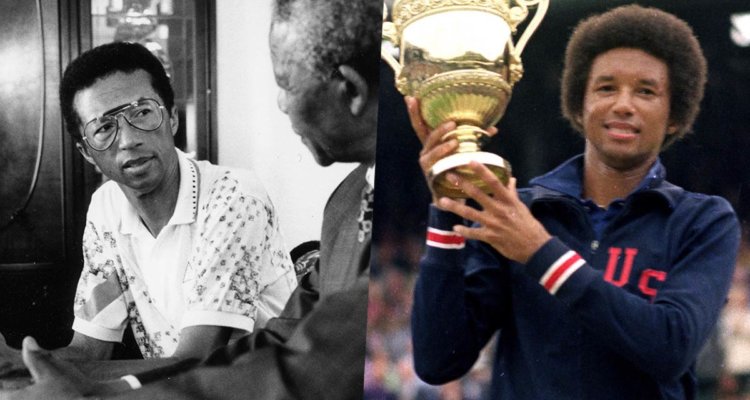This week many people will head to the Arthur Ashe Stadium in Flushing, New York, to attend matches of the U.S. Open tennis tournament. But how many of those fans will know about the legacy of Ashe beyond once being a famous tennis player? Rex Miller and Sam Pollard’s documentary “Citizen Ashe” should help rectify that. The film, which just premiered at the Telluride Film Festival, tackles Ashe’s story and his contributions as a Black man in the predominantly white sport of tennis during a volatile period in this country’s history. Ashe left a formidable legacy, having been part of the Civil Rights movement. He was one of the first people to speak against the Apartheid regime in South Africa. In the 1980s, he contracted HIV/Aids and became an advocate for patient rights in the last few years of his life. This is a life worth examining.
READ MORE: Telluride 2021 Preview: 10 Must-See Films To Watch
Pollard and Miller had access to many people in Ashe’s orbit. Not just tennis mainstays like John McEnroe, who seems as if he’s always in the media. But also Ashe’s brother John Ashe and his wife Jeanne Moutousammy-Ashe, civil rights activist Harry Edwards and tennis players Art Carrington, Lenny Simpson, and Charlie Pasarell.
READ MORE: Fall 2021 Movie Preview: 60+ Must-See Films
However, the most valuable resource they have is Ashe himself. The archival interview footage is what makes this documentary special. Particularly hearing Ashe’s voice describing the events of his life. For stretches of time, it appears as if Ashe is reflecting back, the audience eavesdropping on a conversation he’s having with friends. The footage might be mostly from public TV interviews, but the way Miller and Pollard present it in Ashe’s voice makes it a more intimate affair.
READ MORE: The Best Films Of 2021, So Far
The historical context of Ashe’s rise becomes most fascinating when the film delves into what it meant to be the only Black male tennis player of his time. Althea Gibson preceded Ashe. Edwards insightfully explains why Ashe’s gentility, niceness, and calm made him appear as an “Uncle Tom” to some people, despite the sometimes militant messages he was espousing. But Ashe was a reluctant activist at first. Family and tennis were most important to him, and he wanted to protect both. It took the tumultuous events of 1968, what he called “a difficult year for Black America, ” to spur him into action. The film soberly examines his civil rights work and how Ashe was always put in contrast with Muhammad Ali, a more vocal athlete, and activist. The two were presented as extremes, with Ashe emerging as more palatable to the white establishment.
READ MORE: The 100 Most Anticipated Films Of 2021
In tennis, “Citizen Ashe” contrasts Ashe with the white players that followed after him; Jimmy Connors and McEnroe. They were both brash and given more latitude for bad behavior. Connors never played for the national team or joined the players union. McEnroe was prone to emotional outbursts on court. Ashe was never allowed the same privilege. He had to toe the lines to thrive, as many Black people know all too well. He sums it best when explaining about McEnroe “I’m irritated by him but envious.” This is an angle worth devoting time to as it resonates in sports today with athletes like Naomi Osaka and Simone Biles talking about the emotional toll of playing sports.
READ MORE: The 20 Best Documentaries Of 2020
The documentary comes alive when digging into Ashe’s psyche while playing. Tennis fans will appreciate how deep it goes into Ashe’s game, what he felt when playing and the tactics he employed to win. There is also an expert analysis of his game by his agent Donald Dell among others.
Pollard and Miller choose to highlight two big matches in Ashe’s career. The first was winning the U.S. Open in 1968 while the country was in turmoil and his brother John was fighting in Vietnam. This was the emotional and historic win, the time he embraced becoming a champion. It is contrasted with his 1975 triumph at Wimbledon. He was thirty-two, playing against the brash younger Jimmy Connors. That game proved he still had it. It was the perseverance victory, one that sealed his legacy.
“Citizen Ashe” follows the performance style of TV docuseries. It belongs on CNN, which produced it along with HBOMax. Ashe’s voice distinguishes it, but the filmmaking is not as distinctive as what Pollard achieved with “MLK/FBI.” Perhaps that’s because this is not a confrontational piece. It follows Ashe’s lead of cool, calm and collected. Yet sometimes it needed more oomph to reflect what Ashe was concerned about; racism and equity. He might have been mild-mannered, but he was not shy. This documentary is so agreeable; it can quickly fade away from memory. [B]
Follow along with our full coverage from the 2021 Telluride Film Festival here.

